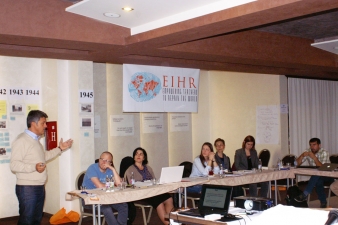Educating and engaging young people in the promotion of human rights was the focus of a workshop organised by the Educators’ Institute of Human Rights (EIHR) on Mount Jahorina in Bosnia and Herzegovina (BiH) on 16 July. The event brought together representatives of organizations active in the field of transitional justice, to discuss the idea of creating relevant content aimed at the prevention of mass atrocities in school curricula across BiH.
ICTY representative, Mr Almir Alić, briefed a group of 15 participants on the Tribunal’s experience of working with high school and university students in the region as part of its Outreach Programme. He explained that information about the conflicts in the former Yugoslavia that is based on the facts has been well received by secondary school students throughout the country. Students and teachers have been very keen to hear directly about the work of the Tribunal and to learn more about specific crimes and cases from its jurisprudence.
Based on the experience of the Tribunal’s Outreach Programme, the workshop participants from BiH, the United States and Italy went on to explore the potential of young people to further the process of facing the past. The participants concluded that there was a clear need to develop relevant content as well as a methodology for educating young people about mass crimes and the importance of their prevention.
As a follow-up to the workshop, the EIHR, in cooperation with its partner organizations, expects to develop educational materials and train teachers to hold lectures about the prevention of mass atrocities. In seeking relevant partnerships, the EIHR recognises the importance of bringing together the rich experiences of educators and those of international organizations and NGOs that work in the field of transitional justice.


